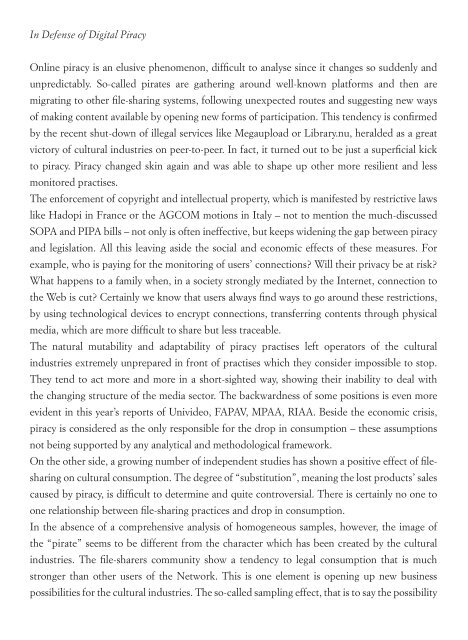XI MAGIS Gorizia International Film Studies Spring School ...
XI MAGIS Gorizia International Film Studies Spring School ...
XI MAGIS Gorizia International Film Studies Spring School ...
- No tags were found...
You also want an ePaper? Increase the reach of your titles
YUMPU automatically turns print PDFs into web optimized ePapers that Google loves.
In Defense of Digital PiracyOnline piracy is an elusive phenomenon, difficult to analyse since it changes so suddenly andunpredictably. So-called pirates are gathering around well-known platforms and then aremigrating to other file-sharing systems, following unexpected routes and suggesting new waysof making content available by opening new forms of participation. This tendency is confirmedby the recent shut-down of illegal services like Megaupload or Library.nu, heralded as a greatvictory of cultural industries on peer-to-peer. In fact, it turned out to be just a superficial kickto piracy. Piracy changed skin again and was able to shape up other more resilient and lessmonitored practises.The enforcement of copyright and intellectual property, which is manifested by restrictive lawslike Hadopi in France or the AGCOM motions in Italy – not to mention the much-discussedSOPA and PIPA bills – not only is often ineffective, but keeps widening the gap between piracyand legislation. All this leaving aside the social and economic effects of these measures. Forexample, who is paying for the monitoring of users’ connections? Will their privacy be at risk?What happens to a family when, in a society strongly mediated by the Internet, connection tothe Web is cut? Certainly we know that users always find ways to go around these restrictions,by using technological devices to encrypt connections, transferring contents through physicalmedia, which are more difficult to share but less traceable.The natural mutability and adaptability of piracy practises left operators of the culturalindustries extremely unprepared in front of practises which they consider impossible to stop.They tend to act more and more in a short-sighted way, showing their inability to deal withthe changing structure of the media sector. The backwardness of some positions is even moreevident in this year’s reports of Univideo, FAPAV, MPAA, RIAA. Beside the economic crisis,piracy is considered as the only responsible for the drop in consumption – these assumptionsnot being supported by any analytical and methodological framework.On the other side, a growing number of independent studies has shown a positive effect of filesharingon cultural consumption. The degree of “substitution”, meaning the lost products’ salescaused by piracy, is difficult to determine and quite controversial. There is certainly no one toone relationship between file-sharing practices and drop in consumption.In the absence of a comprehensive analysis of homogeneous samples, however, the image ofthe “pirate” seems to be different from the character which has been created by the culturalindustries. The file-sharers community show a tendency to legal consumption that is muchstronger than other users of the Network. This is one element is opening up new businesspossibilities for the cultural industries. The so-called sampling effect, that is to say the possibilityText/Roberto Braga




